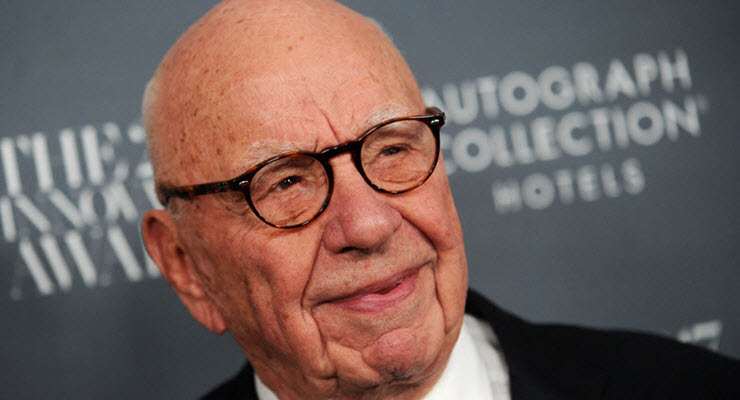
After Proud Boys comes the fall. The squalid ending of the Trump era will have wider-reaching impacts than we can appreciate from here. Among the casualties, as the presidency’s denouement coincides with COVID-19’s peak, will be rafts of fellow travellers.
In Australia, two collaborators stand fiercely exposed by the unclothing of their emperor: the Morrison government, and Rupert Murdoch’s local empire.
The former’s pain is plain to see as China punishes Morrison for his silly pretensions to Trump-protected great power status. Morrison is, as usual, late to the party. Murdoch didn’t do much better; his media organs only began their crab-walk away from Trump on election night.
It’s been a bad year generally for News Corp, consistently backing the losers in the elections that have been held — but usually that’s not a major problem for it. Trump, however, won’t be going away and will happily add Fox News to his list of enemies.
Apart from the direct commercial cost to Murdoch of being left out on a limb by Donald Trump’s defeat, there’s the small issue of his empire’s wildly reckless enabling and support of Trump’s COVID denial, minimisation and destruction.
In the United States, Fox News has done enormous harm by promoting conspiracy theories, downplaying the virus, pushing miracle cures and encouraging super-spreading as an exercise in constitutional freedom.
Locally Sky News has maintained its habit (after dark) of operating as a slightly less unhinged version of Fox, but the entire news group has consistently worked hard to undermine state governments’ efforts to prioritise public health over commercial activity, maintaining a bizarre insistence that we should sacrifice our grandparents for the economic good.
Being exposed as the crazy uncle in the corner is definitely a financial problem for Rupert. Does he have a legal exposure as well?
In the US there have been attempts to sue Fox News over its irresponsible COVID reportage. For example, a not-for-profit organisation launched a suit in April claiming Fox had breached consumer protection laws and committed the exotic tort of “outrage”, or intentional infliction of emotional distress.
That case was kicked out at the gate as the First Amendment’s power defeats most such claims. Free speech in America is constitutionally protected and will kill almost any attempt to apply legal restraint to the media, no matter how irresponsible and incendiary its work may be.
Nobody’s had a crack in Australia yet. It’s generally assumed that when our media produces dangerous garbage there’s no real likelihood of a legal remedy. The regulatory mechanisms — the Press Council for newspapers and Australian Broadcasting Authority for TV and radio — are as toothless as they are popularly understood to be, and treated as an unamusing joke by the media.
I agree any attempt to use the common law to visit legal consequences on media will fail. We don’t have a tort of outrage here (wish we did); in theory, an intentional infliction of harm could support a law suit, but it would never stretch far enough for this context. Negligence is also a non-starter. The media wouldn’t be found to have a general duty of care to their audience.
Then there’s our consumer law, specifically the broad prohibition of “misleading or deceptive conduct” in “trade or commerce”. There’s a case theory here which would be radical if attempted, but I don’t think impossible.
Generally speaking, a media outlet will not be potentially liable for broadcasting or publishing misleading information because of the absence of a link between its actions and the causing of harm to anyone. There’s also a caveat placed by the constitutionally implied freedom of communication in relation to government and political matters, but that’s only marginally relevant.
However, what if it was an intrinsic part of the business model of a media organisation to mislead the public in direct pursuit of controversy and therefore attention, and therefore audience share (and therefore subscriber and advertising revenue)?
If as an integral component of its commercial activity News Corp set out to produce volumes of reportage and editorial in relation to the pandemic, designed to misrepresent to its audience the facts of the situation and how people should respond to it, then it might be argued it was engaging in misleading or deceptive conduct in trade or commerce (as opposed to merely exercising its freedom to broadcast rubbish to the gullible for their entertainment).
Say, then, that people could show they suffered harm by reason of News’ commercial conduct, which they wouldn’t have to prove resulted directly from their own reliance on what News said but could, for example, be as a result of other people’s reliance which then placed them in harm’s way (the Bunnings scenario). If so they would have an arguable case against News for damages.
Radical but not impossible. Just saying.








Good lateral thinking here.
Perhaps, the wilful denial of climate change could also be added to the case.
Start a case with crowd-funding Michael, and include bushfire victims/climate change as well. No matter if it fails, the publicity would be worth it. Murdoch’s influence comes from the perception of his influence and could prove fragile from now on.
Maybe could get them the same way on global warming. Getup has just done a study on the climate denialist slant of Newscorp articles.
Where do I give?
It may not be viable to sue News Corpse for misleading and deceptive conduct but I suggest that case actions by citizens against any public corporations who wilfully pollute may be viable. look at the work being done by young Melbourne lawyer David Barnden.